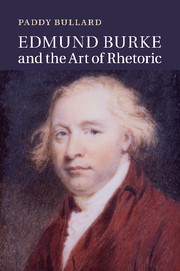Book contents
- Frontmatter
- Contents
- Acknowledgements
- Abbreviations
- Introduction: Burke, rhetoric and ethics
- 1 The ethical turn in early modern rhetoric, 1600–1760
- 2 Rhetoric in Ireland, 1693–1765
- 3 The Epicurean aesthetics of the Philosophical Enquiry
- 4 Episodes in the evolution of Burke's eloquence
- 5 Reflections on the Revolution in France and the rhetoric of character
- 6 Burke, Rousseau and the purchase of eloquence
- Conclusion
- Notes
- Bibliography
- Index
Introduction: Burke, rhetoric and ethics
Published online by Cambridge University Press: 01 June 2011
- Frontmatter
- Contents
- Acknowledgements
- Abbreviations
- Introduction: Burke, rhetoric and ethics
- 1 The ethical turn in early modern rhetoric, 1600–1760
- 2 Rhetoric in Ireland, 1693–1765
- 3 The Epicurean aesthetics of the Philosophical Enquiry
- 4 Episodes in the evolution of Burke's eloquence
- 5 Reflections on the Revolution in France and the rhetoric of character
- 6 Burke, Rousseau and the purchase of eloquence
- Conclusion
- Notes
- Bibliography
- Index
Summary
William Wordsworth finished his studies at Cambridge University in January 1791, and spent the next four months kicking his heels in London, ‘whirled about by the vortex of its strenua inertia’, as he wrote to a friend. In contemporary letters and later memoirs we see him making his first contact with the radical dissenting circles that would welcome him as an active member in 1793 – but he keeps an eye on mainstream politics as well. He pores over the ‘master pamphlets of the day’, and attends debates at the House of Commons. One ‘tongue-favoured’ orator in particular sets his heart racing with excitement during a visit to the strangers' gallery, as he later recalls in Book vii of The Prelude:
This is no trifler, no short-flighted wit,
No stammerer of a minute, painfully
Delivered, No! the Orator hath yoked
The Hours, like young Aurora, to his Car:
Thrice welcome Presence! how can patience e'er
Grow weary of attending on a track
That kindles with such glory! All are charmed,
Astonished; like a Hero in Romance,
He winds away his never-ending horn;
Words follow words, sense seems to follow sense;
What memory and what logic! till the Strain
Transcendent, superhuman as it seemed,
Grows tedious even in a young Man's ear.
Editorial tradition has it that this is a portrait of William Pitt the younger, probably on account of some earlier references Wordsworth makes to the familiarity of the Pitt family name.
- Type
- Chapter
- Information
- Edmund Burke and the Art of Rhetoric , pp. 1 - 24Publisher: Cambridge University PressPrint publication year: 2011



